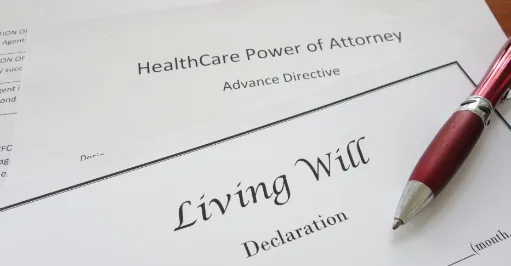What is a healthcare proxy, and what does it do?
When creating an estate plan, one of the most important documents to include is a health care proxy (advance directive). A healthcare proxy is a legal document that gives another person the authority to make medical decisions on your behalf if you cannot do so yourself. Healthcare proxies can be used in both routine and emergencies and provide peace of mind for your loved ones, knowing they can act on your behalf.
It is crucial to choose someone you trust to be your healthcare proxy, as they will decide your healthcare based on your best interests. It would help if you also discussed your wishes with your healthcare proxy in advance so that they know your preferences.
What is a power of attorney, and what does it do?
A Power of Attorney (POA). A power of attorney is a legal document that gives another person the authority to act on your behalf. The person granting a power of attorney is the principal. The agent or attorney-in-fact is a fiduciary. That means they are responsible for managing some or all of another person’s affairs. The fiduciary must act responsibly with the principal’s affairs whom they are addressing. A violation of their fiduciary duties could create liability for the agent, including possible criminal charges.
There are two typical forms for a power of attorney:
- a Springing Durable Power of Attorney, which comes into effect when certain conditions are met (typically if you become disabled or mentally incompetent) and may require a medical professional to certify; and
- a General Durable Power of Attorney becomes effective as soon as it is signed and continues until you die.
How can you choose the right person to be your healthcare proxy or power of attorney agent?
A healthcare proxy or agent of your power of attorney (with healthcare provisions) is someone you designate to make healthcare decisions on your behalf if you cannot do so yourself. Choosing the right person to be your agent is important, as they will communicate with your healthcare providers and be responsible for potentially life-altering decisions on your behalf, including medical treatment decisions.
There are a few key factors to consider when choosing an agent. First, you should select someone you trust implicitly and who shares your values regarding healthcare. It is also essential to choose an agent capable of making difficult decisions, as they may be called upon to do so at some point. Finally, you should select an agent who lives close by, as they may need to be available on short notice.
By taking the time to thoughtfully select your healthcare proxy or power of attorney agent, you can ensure that your wishes will be carried out if you cannot make them yourself.
What Does Your Agent Need to Know?
Once you have decided who will act as your agent, you must have a frank conversation with that person to help them understand your goals and priorities for your health care and the values you want your agent to follow on your behalf. It is also essential to provide information crucial for your agent to know to make decisions regarding your care, preferably in writing.
Preferred providers. You should provide the name, phone number, and address of the doctor you would like to be your attending physician and other physicians and healthcare providers you would prefer to treat you if necessary. Likewise, if there are any physicians or providers you do not wish to treat, you can also furnish a list of those providers.
Medical conditions. You should ensure your agent knows about any medical conditions that may impact your care. For example, suppose you have a medical condition that may cause or appear similar to psychiatric symptoms. In that case, you can instruct your agent to have your physician rule out those medical conditions before authorizing psychiatric care or treatment.
Treatment and medical history. If you have had surgeries or other medical procedures, give your agent a list and the dates they occurred.
Medications. You should provide your agent with a list of all your medications. Further, if you want your agent to refuse to authorize certain medicines, you should specify that wish.
Allergies. If you have allergies, particularly medications or foods, provide them to your agent.
Religious beliefs. Communicating with your agent about your spiritual beliefs and values is very important. These beliefs affect your choices about the extent or aggressiveness of medical treatment you would like to receive. You should also discuss if you want any religious customs or rites you would like to observe.
When do these documents take effect, and how long do they last?
Healthcare proxies and powers of attorney will take effect immediately, and they will last for six months. After that, they will need to be renewed. Renewal is simple: submit a new application and pay the renewal fee. The documents will then be valid for another six months.
Are any risks associated with having a health care proxy or power of attorney in place?
While having a healthcare proxy or power of attorney in place can be incredibly beneficial, there are also some risks associated with this arrangement. For example, if the person you appoint as your proxy is not competent or trustworthy, they could make decisions that are not in your best interests. Additionally, a disagreement between your proxy and your family or friends could lead to conflict and stress at a time when you are already vulnerable. It is essential to consider these risks carefully before appointing someone as your healthcare proxy or power of attorney. Ultimately, you should only implicitly appoint someone you trust to make decisions in your best interests.
How can you revoke or change your health care proxy or power of attorney if needed?
If you have named a healthcare agent or given someone power of attorney, you may change your mind anytime. You can always amend your health care proxy or power of attorney. Often a new document is executed to replace the older version. The new documents must be signed and dated by you and witnessed by two adults who are not named as your health care proxy or alternate health care proxy. Once you have revoked your healthcare proxy or power of attorney, it cannot be used for future medical decisions. Please get in touch with us if you have questions about revoking your healthcare proxy or power of attorney.
Health care proxy and a living will: How are they different?
Health care proxies and living wills are two different but essential documents to have in place as part of your overall estate planning. A healthcare proxy is a document that allows you to appoint someone you trust to make healthcare decisions on your behalf if you cannot do so yourself. A living will is a document that states your wishes regarding healthcare if you cannot make decisions yourself. For example, a living will say that you do not want life-sustaining treatment if you are terminally ill or in a coma if you have no reasonable chance of recovery.
Now that you know the ins and outs of healthcare proxies and powers of attorney, you can make an informed decision about what’s best for you and your loved ones. If you have any questions or want to start drafting these documents, book a call with us, we are happy to discuss this or any of your estate planning concerns with you. We can help you put a comprehensive plan in place for your protection, so your family members are provided for and protected. You may be surprised at the peace of mind you can gain by knowing that you planned for whatever the future holds.






